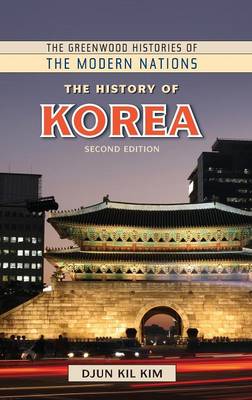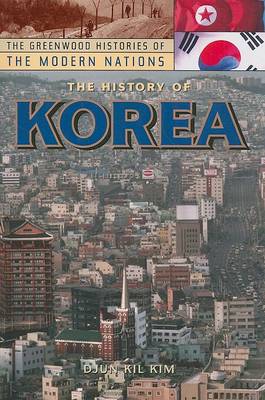Greenwood Histories of the Modern Nations
2 total works
This revised edition examines North and South Korea's political, socio-economic, and cultural history from the Neolithic period to the early 21st century, including issues of recent political unrest and preparations for the 2018 Winter Olympics.
Korea continues to be featured in the news, especially after the succession of Kim Jong-un as leader of North Korea and his threats of nuclear attack. Yet the reported instability of the North is contrasted by the rapid modernization revolution of the South. Author Djun Kil Kim analyzes how tragic experiences in the regions' collective history-particularly Japanese colonial rule and the division of the country-have contributed to the dichotomous state of affairs in the Koreas.
This comprehensive overview traces the development of two contradistinctive nations-North and South Korea-with communism in the north and democracy and industrialization in the south transforming the geopolitical and geo-economic condition of each area. Author Kim explores specific doctrines that revolutionized Korea: Buddhism and Neo-Confucianism in the mid-7th and the late 14th centuries; and communism and American functionalism in the 20th century. The second edition includes an updated timeline, new biographical sketches of notable people, and an additional chapter covering the events of 2004 through the present day.
- Includes an expanded bibliography with additional print and electronic sources
- Provides updated accounts of both North and South Korea's more recent events that enable readers to grasp the global significance and power of both nations
The Koreas are two of the few countries in the East Asian world to successfully maintain political and cultural independence from China. Originated by the Han-Ye-Maek people who had migrated from North China to Manchuria and the Korean peninsula since 2000 BCE, three Korean dynasties-Great Silla, Koryo, and Choson-kept peace and prosperity in the country since the 7th century, nurturing a civilization based on Buddhism, Confucianism and the East Asian world-system. Korea, despite experiencing Japanese dominion and the nation's division, now looks forward to enjoying its prosperity as a member of the global community and to seeing a unified Korea. This volume provides a comprehensive review of Korea's history, from its roots in Neolithic civilization, and the tradition and evolution of nation-building in the traditional East Asian world system, through Korea's global setting in modern times. Also included are a biographical section highlighting famous figures in Korean history, a timeline of important historical events, a glossary of Korean terms, and a bibliographical essay with suggestions for further reading.
The historical origin of Korean identity in the East Asian world, Korea's failure to adapt to a changing East Asian world-system, as well as the political division Korea suffered in the second half of the 20th century are discussed. Readers will benefit from the inclusion of direct translations from original classical Chinese and Korean sources by the author. Excellent as a reference tool for students and general readers interested in the history of this unique nation.

